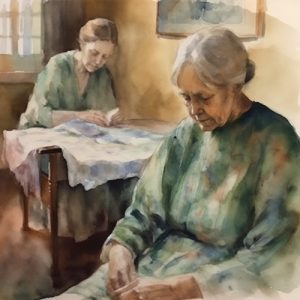Elder abuse, a disheartening issue that plagues many older Americans, often remains hidden from the public eye. Vulnerable seniors, particularly women with disabilities who rely on others for their care, face a higher risk of exploitation and mistreatment. Shockingly, estimates suggest that more than 10% of those aged 60 and older experience elder abuse, with many cases going unreported. This issue becomes even more pressing during times of economic uncertainty and inflation when ensuring seniors have safe living conditions and are not financially exploited becomes paramount.
Without proactive measures to prevent elder abuse, the problem will continue to grow as the United States undergoes a significant demographic shift. The U.S. Census Bureau projects that the population aged 65 and older will nearly double from 43.1 million in 2012 to 85.7 million in 2050. This dramatic increase is attributed to the aging Baby Boomer generation, with many individuals reaching 65 years of age from 2011 onwards. By 2030, one in five U.S. residents will be of retirement age, emphasizing the urgency of addressing elder abuse.
Elder Abuse in South Carolina Nursing Homes
In recent times, media coverage has exposed instances of elder abuse within nursing homes in South Carolina. While most nursing homes strive to provide high-quality care by dedicated professionals, not all facilities meet these standards – and even well-run institutions can experience issues. If you have a loved one who has suffered harm while under the care of a nursing home, seeking legal counsel is essential.
Elder abuse encompasses both intentional and negligent acts by caregivers or trusted individuals that cause harm or pose a serious risk to older adults. Financial fraud is one of the fastest-growing forms of elder abuse, involving the illegal or improper use of a vulnerable senior’s money or property.
A startling fact is that in 2022, South Carolina was ranked as the third worst state in terms of preventing elder abuse. An article by WalletHub revealed that the state lagged in 16 metrics, including gross neglect and exploitation complaints, eldercare organization numbers, nursing home quality, and financial elder abuse laws. South Carolina shared the unfortunate distinction of having one of the highest rates of elder abuse, gross neglect, and exploitation complaints near the rates of California and Nevada. The state also ranked poorly in total expenditures on elder abuse prevention, the number of eldercare organizations and services, and the quality of nursing homes. In 2018, South Carolina ranked last for elder-abuse protections.
 Cases of nursing home abuse or abuse by caregivers of the elderly are often reported to the South Carolina Medicaid Fraud Control Unit (SCMFCU), investigated by the SC Department on Aging, Office of the State Long-Term Care Ombudsman, and prosecuted by the Attorney General’s Office. Abuse of a vulnerable adult is a felony with penalties of up to five years in prison.
Cases of nursing home abuse or abuse by caregivers of the elderly are often reported to the South Carolina Medicaid Fraud Control Unit (SCMFCU), investigated by the SC Department on Aging, Office of the State Long-Term Care Ombudsman, and prosecuted by the Attorney General’s Office. Abuse of a vulnerable adult is a felony with penalties of up to five years in prison.
Investigation and documentation are crucial in building a solid foundation for an abuse case, countering any claims that injuries are overstated or pre-existing. In nursing home abuse cases, scrutinizing the facility’s hiring, training, and supervision policies and procedures can shift the responsibility from individual employees to the nursing home as a whole.
It’s important to note that insurance policies held by nursing homes may not cover abuse situations as they often apply to intentional conduct rather than negligence, affecting who is liable in court.
Seeking Justice for Your Loved One
If you suspect that your family member or loved one in a nursing home is suffering from neglect or abuse in any form, do not hesitate to contact The Floyd Law Firm. We are committed to helping you hold nursing homes and their staff accountable. A negligence lawsuit may be necessary if there is a failure to provide adequate health, safety, medical treatment, or a reasonably safe environment. Nursing home negligence encompasses neglect, physical abuse, financial abuse, and mental or emotional abuse. Your loved one’s well-being and rights are our priority, and we are here to ensure they receive the justice and recovery they deserve.
Learn More
South Carolina Attorney General’s Office – Medicaid Fraud Control Unit
Medicaid Fraud Control Units (MFCUs) investigate and prosecute Medicaid provider fraud as well as abuse or neglect of residents in health care facilities and board and care facilities and of Medicaid beneficiaries in noninstitutional or other settings. MFCUs operate in each of the 50 States, the District of Columbia, Puerto Rico, and the U.S. Virgin Islands. MFCUs, usually a part of the State Attorney General’s office, employ teams of investigators, attorneys, and auditors; are constituted as single, identifiable entities; and must be separate and distinct from the State Medicaid agency. OIG, in exercising oversight for the MFCUs, annually recertifies each MFCU, assesses each MFCU’s performance and compliance with Federal requirements, and administers a Federal grant award to fund a portion of each MFCU’s operational costs.
The National Center on Elder Abuse (NCEA) is a national resource center dedicated to the prevention of elder maltreatment. The NCEA was first established by the U.S. Administration on Aging (AoA) in 1988 as a demonstration project on abuse, neglect, and exploitation. Given permanent status in the 1992 amendments to Title II of the Older Americans Act, the NCEA provides professionals, policymakers, and the public information and resources on elder abuse prevention and response to help ensure that older adults age with dignity and respect, free from maltreatment.





